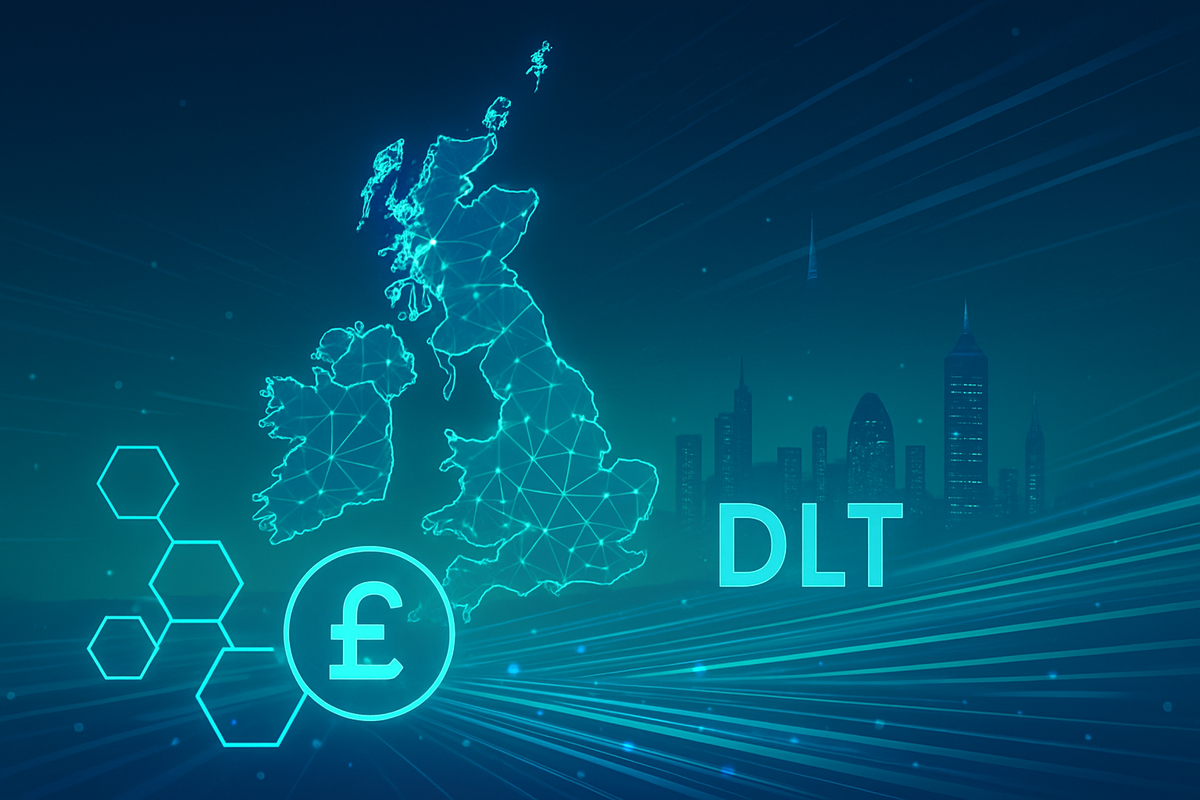UK Forges Ahead in Digital Finance: New 'Digital Markets Champion' to Spearhead Tokenization

The United Kingdom is poised to solidify its position as a global leader in the evolving landscape of digital finance with the imminent appointment of a 'Digital Markets Champion'. This strategic move, part of the government's ambitious Wholesale Financial Markets Digital Strategy, aims to accelerate the adoption of tokenization and Distributed Ledger Technology (DLT) across wholesale financial markets. While a specific individual for this pivotal role has yet to be publicly named as of October 2025, the initiative signals a strong commitment from the UK government to modernize its financial infrastructure and harness the power of digital assets.
This champion will be tasked with leading and coordinating efforts across the private sector, fostering international alignment, and collaborating with regulators to dismantle barriers to digitalization. The ultimate goal is to enhance market efficiency, transparency, and reduce operational costs, thereby bolstering the UK's competitiveness on the global stage.
Spearheading a Digital Revolution: The UK's Strategic Push for Tokenization
The appointment of a 'Digital Markets Champion' is a cornerstone of the UK government's broader vision for a digitally advanced financial sector. This champion will not merely be an advisor but a driving force, responsible for a multifaceted agenda designed to integrate DLT and tokenization into the very fabric of wholesale financial markets. Their mandate includes providing leadership from and for the sector on wholesale market digitalization, ensuring that the UK's efforts are aligned with international initiatives to prevent fragmentation and reinforce its status as a premier global financial hub.
A critical aspect of the champion's role will be to promote robust collaboration between government bodies, regulatory authorities, and industry stakeholders. This collaborative ecosystem is deemed essential for identifying and effectively addressing the myriad barriers—both technical and regulatory—that currently impede the widespread adoption of digital solutions. The champion will also actively support the sector in testing, scaling, and rolling out solutions that tokenize financial assets and streamline post-trade processes. This includes advocating for a cross-sectoral approach to DLT adoption, moving beyond isolated pilot projects to systemic integration. Furthermore, they will contribute significantly to shaping a progressive regulatory and legislative framework, ensuring that new digital solutions can be adopted and implemented with agility. This proactive approach aims to transform the UK's market infrastructure, simplify transactions, and increase efficiency, potentially leading to a fundamental reimagining of how financial markets operate. An example of this strategy in action is the planned issuance of a 'Digital Gilt Instrument' (DIGIT) through the Digital Securities Sandbox, an initiative the champion will help facilitate to explore the benefits of DLT in debt issuance.
Initial reactions from the industry, while awaiting the specific appointment, have been largely positive. Financial institutions and fintech firms have expressed optimism that a dedicated champion will provide the necessary impetus and coordination to move beyond theoretical discussions to practical implementation. The focus on regulatory clarity and cross-industry collaboration is particularly welcomed, as these have often been cited as significant hurdles to innovation in the past. This initiative builds upon earlier government reports and consultations, demonstrating a sustained commitment to fostering a competitive and technologically advanced financial services sector.
Navigating the Digital Tides: Winners and Losers in the Tokenization Era
The UK's aggressive push into tokenization through its 'Digital Markets Champion' will inevitably create a new landscape of opportunities and challenges, delineating clear potential winners and losers within the financial ecosystem.
Potential Winners:
- Innovative Fintech Companies and Blockchain Startups: Firms specializing in DLT solutions, smart contracts, and tokenization platforms stand to gain immensely. Companies like Fnality Global Payments (Private), which is developing a wholesale payments system using DLT, or emerging blockchain infrastructure providers, could see increased demand for their services as traditional institutions seek to integrate tokenized assets. Their expertise will be crucial in building and maintaining the new digital infrastructure.
- Forward-Thinking Incumbent Banks and Financial Institutions: Large banks that proactively invest in digital asset capabilities and collaborate with the 'Digital Markets Champion' and fintechs will likely gain a competitive edge. Institutions such as Barclays (LSE: BARC), HSBC (LSE: HSBA), and Lloyds Banking Group (LSE: LLOY) that embrace tokenization for asset issuance, trading, and post-trade processing could benefit from reduced costs, increased efficiency, and access to new revenue streams through fractional ownership and broader investor bases. Their established market presence and client networks will be powerful assets in the digital transition.
- Digital Asset Exchanges and Market Infrastructure Providers: Existing and new digital asset exchanges, as well as traditional market infrastructure providers like the London Stock Exchange Group (LSE: LSEG) that adapt their platforms for tokenized securities, will see increased transaction volumes and new product offerings. The ability to support the issuance and trading of tokenized bonds, equities, and other wholesale instruments will be a significant differentiator.
- Custody and Asset Servicing Firms with Digital Capabilities: As tokenized assets proliferate, the demand for secure digital custody and asset servicing will grow. Firms that can offer robust, compliant, and technologically advanced solutions for managing digital assets will be in high demand.
Potential Losers (or those facing significant challenges):
- Traditional Market Infrastructure Providers Slow to Adapt: Companies heavily reliant on legacy systems and unwilling or unable to invest in DLT and tokenization technologies may find their services becoming obsolete or less competitive. The high costs associated with maintaining traditional infrastructure could become a significant burden as more efficient digital alternatives emerge.
- Intermediaries with Redundant Roles: Some traditional intermediaries in the post-trade process, whose functions can be automated or disintermediated by DLT, may face pressure. While tokenization doesn't eliminate all intermediaries, it can streamline processes, potentially reducing the need for certain manual or multi-step operations.
- Firms Resistant to Regulatory Evolution: Companies that struggle to adapt to new regulatory frameworks designed for digital assets or those that resist collaboration with the 'Digital Markets Champion' and other industry players may fall behind. The dynamic nature of digital finance requires flexibility and a willingness to embrace change.
- Smaller, Under-Resourced Firms: While tokenization offers opportunities, the initial investment in technology, talent, and compliance can be substantial. Smaller firms with limited resources may find it challenging to compete with larger, well-funded players in adopting these new technologies, potentially leading to consolidation in the market.
Ultimately, success in this evolving landscape will hinge on a firm's agility, willingness to innovate, and strategic alignment with the UK's digital finance agenda.
A New Dawn for Financial Markets: Broader Significance of UK's Tokenization Drive
The UK government's commitment to appointing a 'Digital Markets Champion' for tokenization in wholesale financial markets extends far beyond a mere administrative decision; it signifies a profound shift in the global financial paradigm. This initiative is deeply embedded within broader industry trends emphasizing the digitalization of assets, the transformative potential of blockchain technology, and the overarching drive for greater efficiency and transparency in financial operations. It positions the UK at the forefront of a global race to redefine financial market infrastructure for the 21st century.
This move will likely have significant ripple effects on competitors and partners alike. Other major financial centers, such as New York, Singapore, and Frankfurt, are also exploring or implementing their own digital asset strategies. The UK's champion, with a mandate for international alignment, aims to ensure interoperability and prevent regulatory fragmentation, which could otherwise hinder global digital asset markets. This proactive stance could pressure other jurisdictions to accelerate their own initiatives or risk falling behind in attracting digital finance innovation. For instance, the European Union's DLT Pilot Regime provides a similar sandbox environment, and the UK's champion will be key to ensuring the UK remains competitive and complementary rather than isolated.
From a regulatory and policy perspective, the champion's role is critical in shaping a fit-for-purpose framework for digital assets. The existing regulatory landscape, largely designed for traditional finance, often struggles to accommodate the unique characteristics of tokenized securities and DLT. By actively contributing to the development of a responsive framework, the champion can help mitigate regulatory uncertainty, which has historically been a significant barrier to institutional adoption of digital assets. This initiative builds upon the UK's broader efforts, including the Financial Services and Markets Act 2023, which provides a framework for regulating stablecoins and other digital assets. Historically, major financial innovations, from the introduction of electronic trading to the rise of derivatives markets, have always necessitated regulatory adaptation. The UK's current approach mirrors these precedents by proactively engaging with the technology rather than reacting to it. The government's focus on a 'Digital Gilt Instrument' (DIGIT) within the Digital Securities Sandbox is a clear signal of its intent to lead by example in exploring DLT's benefits for sovereign debt issuance, a move that could set a global benchmark.
The Path Ahead: Navigating the Future of Tokenized Finance
The appointment of a 'Digital Markets Champion' marks not an end, but a pivotal beginning in the UK's journey towards a fully digitized wholesale financial market. The short-term possibilities are centered around the acceleration of pilot projects and the refinement of regulatory sandboxes. We can expect to see an increased number of financial institutions and technology providers leveraging the Digital Securities Sandbox to test and deploy tokenized securities, potentially including a wider range of assets beyond the planned 'Digital Gilt Instrument' (DIGIT). The champion's immediate focus will be on fostering greater collaboration to identify and dismantle specific technical and regulatory hurdles, ensuring that these pilot schemes can transition into scalable, real-world applications.
In the long term, the implications are transformative. The UK aims to establish a robust and interconnected ecosystem for digital assets, leading to significantly enhanced market liquidity, reduced settlement times, and lower operational costs across the board. This could pave the way for entirely new financial products and services, such as fractional ownership of illiquid assets, more efficient cross-border payments, and programmable finance. Potential strategic pivots for financial institutions will include significant investments in DLT infrastructure, retraining of staff in digital asset management, and the formation of strategic partnerships with fintech innovators. Market opportunities will emerge in areas like digital asset custody, decentralized finance (DeFi) integration for institutional clients, and the development of new trading venues specifically designed for tokenized securities. Challenges will include managing cybersecurity risks inherent in new technologies, ensuring regulatory harmonization with other global centers, and overcoming the inertia of deeply entrenched legacy systems within some institutions. Potential scenarios range from a gradual, phased adoption of tokenization across various asset classes to a more rapid, disruptive shift driven by technological breakthroughs and strong policy support. The success of the champion will be measured by their ability to navigate these complexities and foster an environment where innovation thrives while maintaining financial stability and integrity.
Charting a Digital Course: A Summary of UK's Tokenization Ambition
The UK government's decision to appoint a 'Digital Markets Champion' for tokenization in wholesale financial markets is a clear and decisive statement of intent: to position the nation at the vanguard of digital finance. The key takeaway is a proactive, coordinated strategy aimed at leveraging Distributed Ledger Technology (DLT) and tokenization to modernize financial market infrastructure, enhance efficiency, and bolster the UK's global competitiveness. While the specific individual for this role is yet to be named, the defined mandate—to lead industry collaboration, align with international efforts, and shape regulatory frameworks—underscores a comprehensive approach.
Moving forward, the market can anticipate an accelerated pace of innovation and adoption in tokenized assets. This initiative is set to drive significant investment in DLT infrastructure and foster a more dynamic ecosystem for financial technology. The 'Digital Markets Champion' will be instrumental in bridging the gap between traditional finance and the burgeoning digital asset space, creating a more streamlined and resilient financial system.
The lasting impact of this move could be profound, fundamentally reshaping how assets are issued, traded, and settled in the UK and potentially influencing global standards. Investors should closely watch for the specific appointment of the 'Digital Markets Champion', as their background and vision will be critical. Furthermore, attention should be paid to the progress of initiatives within the Digital Securities Sandbox, particularly the 'Digital Gilt Instrument' (DIGIT), as these will serve as crucial test cases for broader adoption. The evolution of regulatory frameworks and the pace of industry collaboration will also be key indicators of success in the coming months, offering insights into the future trajectory of the UK's digital financial markets.
This content is intended for informational purposes only and is not financial advice
More News
View More




Recent Quotes
View More
Quotes delayed at least 20 minutes.
By accessing this page, you agree to the Privacy Policy and Terms Of Service.